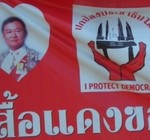Considering that Thaksin had said she was his clone and Vejjajiva had cautioned that a vote for Yingluck was a vote for Thaksin, this is transparently the victory of the ousted Thaksin who has lived in exile in Dubai for the past five years, apprehending arrest on criminal charges if he had tried to enter Thailand.
The hotly debated question is whether and how soon Thaksin can return to claim his political mandate. To his credit, former PM Vejjajiva recognized Yingluck Shinawatra’s victory and stepped aside gracefully; the Army Chief has made clear that no coups will be attempted.
Our unsolicited advice to Miss Shinawatra is not to hasten the return of her brother, as it could generate a backlash from the still-popular monarch and his disappointed supporters. If she plays her cards right, despite being a political novice and a clear front for her brother, she could commence a process of reconciliation and economic resurgence that Thailand so badly needs. Recognizing the delicacy of the situation, Thaksin has himself said he would only return at an appropriate moment.
While Thailand’s first woman Prime Minister is being exhorted to adopt conciliatory postures to enhance the survival possibilities of her government, the political fissures reflected in the rich-poor, urban-rural divides of Thailand are deeply etched. Years of democratic and populist rhetoric have empowered a previously docile rural population even as new communication technologies have shortened the political distance to Bangkok, for decades the preserve of the political elite. Moreover the families of the dead and imprisoned Red Shirts will demand justice which will certainly alienate the establishment Yellow Shirts further.
The King is ailing, Crown Prince Maha Vajiralongkorn has always been unpopular and the Thai constitution has not been amended to enable the well-loved Princess Mahachakri to succeed to the throne.
Looking into the future therefore, it would seem that the huge democratic vote that the Shinawatras received could be the beginning of the end for the Thai monarchy.
The very fact that rural Thailand –which constitutes the support base of the Shinawatras – was steadfast in its support to them for the last five years, implies that the old loyalty to the monarch has been supplanted by more modern and democratic aspirations. This includes intangibles like freedom of expression —still curbed by Thailand’s draconian lèse-majesté laws, used freely to scotch any challenge to the established dispensation.
The increasingly anachronistic monarchy may be on its way out, but Thaksin-style politics won’t be a panacea either. What is commonly referred to as the populism that characterized the Thaksin years, – like free medical care and targeted cash transfers to the rural areas – constituted an attempt to divert some of the resources consumed in Bangkok to his rural poor supporters. This trend could take Thailand towards fiscal mismanagement, because in this election, goodies have been promised, Tamil Nadu-style, like televisions and cycles, by both parties.
Since the end of military rule in 1979, the Thai economy has grown at an average rate of over 7% annually to raise the per capita income to $4,716. Although the economy suffered grievously during the Asian financial crisis when the Thai Baht collapsed, there had been a strong recovery. That momentum was unfortunately lost in the last five years by the political machinations emanating from the palace establishment which included the ouster of two other elected prime ministers believed to be supportive of Thaksin.
Nevertheless, this election shows that the national pie, incomes and assets will have to be divided differently if political peace is to prevail.
Neelam Deo is a former Indian Ambassador and consul general, New York and director, Gateway House: Indian Council on Global Relations, Mumbai.
This article was exclusively written for Gateway House: Indian Council on Global Relations. You can read more exclusive content here.
For interview requests with the author, or for permission to republish, please contact outreach@gatewayhouse.in.
© Copyright 2011 Gateway House: Indian Council on Global Relations. All rights reserved. Any unauthorized copying or reproduction is strictly prohibited.
Indo-Thai Relations
Thailand’s significance to India has begun to be appreciated as evident from the discussions relating to the Indo-Thai Free Trade Agreement (FTA) which moved faster than the wider Indo-ASEAN FTA. The current $6 billion in Indo-Thai bilateral trade is expected to double by 2014 as the Comprehensive Economic Cooperation Agreement (CECA) between the two nations moves towards fruition.
Thai investment in India at $831 million is almost three times that of India’s $282 million investment in Thailand. But Indian investment in Thai infrastructure projects such as airports, highways, power and energy, water supply and irrigation is expected to add $500 million in the bilateral over the next five years. Thai companies in India are bidding for projects in aviation and airport management, canals and irrigation, townships and urban infrastructure.
Thailand is India’s best partner for working together with Bangladesh and Myanmar to stimulate the economies of our North Eastern states. Fortunately, the political bilateral has been warm, bolstered by the common membership of the two countries in various regional economic organizations such as BIMSTEC (Bay of Bengal Initiative for Multi-Sectoral Technical and Economic Cooperation).
The Thai economy is significant within the context of ASEAN but also because it has been a magnet for refugees from its troubled neighbours –Myanmar, Cambodia and still-Communist Laos. The democratic evolution of Thailand has a demonstration effect on its neighbours in ASEAN, all themselves at various stages of democratization as they transition out of a mindset that privileged stability over equity. Although no change is expected in Thai foreign policy, the election of a new administration could soften recent hostilities with Cambodia over the Preah Vihara temple on their common border. For India, a more democratic neighbourhood is a more positive arena in which to extend and deepen our trade and political networks.


